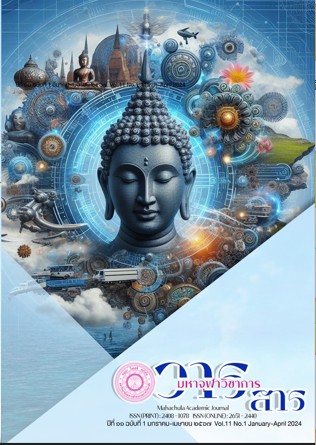An Analysis of Life Quality Development Based on Kamabhogisukha
Main Article Content
Abstract
This research consisted of the following objectives: 1) to investigate Kāmabhogīsukha in the Buddhist texts; 2) to explore life quality development in the Buddhist texts; and 3) to analyze life quality development based on Kāmabhogīsukha. The study employed a qualitative research method by way of studying documents, academic texts, and related research works.
From the study, the findings found that Kāmabhogīsukha (house-life happiness) can be divided into the following kinds: Atthi sukha or the happiness of possessing wealth and property; Bhogī sukha or the happiness of using or enjoying that wealth and property; Ānaṇya sukha or the happiness of being free from debt; and lastly, Anavajja sukha or happiness that gains through living a life of blameless. Without committing unwholesome actions through modes of speech, actions and thoughts leads to such joy. The development of life quality in the Buddhist texts refers to the appropriate coexistence of individuals with others in the society, without becoming a burden or causing problems to society. Three Buddhist principles are relevant to the development of life quality are as follows: Bhāvanā (four kinds of development); Puññakiriyā-vatthu (three bases of meritorious actions); and Tisikkhā (the threefold training). An analysis of life quality development based on Kāmabhogīsukha revealed that individuals would be happy after practicing Kāmabhogīsukha. An action causes happiness gained from having and using wealth. Non-action causes happiness derived by being debt-free and through living a life of wholesome work.
Article Details

This work is licensed under a Creative Commons Attribution-NonCommercial-NoDerivatives 4.0 International License.
References
เกษม จันทร์แก้ว. วิทยาศาสตร์สิ่งแวดล้อม. พิมพ์ครั้งที่ ๔. กรุงเทพมหานคร: มหาวิทยาลัยเกษตรศาสตร์, ๒๕๔๔.
เกียรติวรรณ อมาตยกุล. วิถีแห่งพุทธ. กรุงเทพมหานคร: วิถีแห่งความสุข, ม.ป.ป..
ณ ลินพัฒน์. การพัฒนาคุณภาพชีวิต. กรุงเทพมหานคร: แพร่พิทยา, ๒๕๔๑.
นิพนธ์ คันธเสวี. คุณภาพชีวิตในการศึกษาและวัฒนธรรม ประมวลบทความทางวิชาการ. สำนักงานปลัดกระทรวงศึกษาธิการ. กรุงเทพมหานคร: บริษัทประชาชนจำกัด, ๒๕๒๖.
พระธรรมโกศาจารย์ (เงื่อม อินฺทปญฺโญ). หนังสือชุดลอยปทุม ในวาระ ๑๑๐ ปี ชาตกาล พุทธศักราช ๒๕๕๙ พระธรรมโกศาจารย์ (พุทธทาสภิกขุ). กรุงเทพมหานคร: ธรรมสภาและสถาบันบันลือธรรม, ๒๕๕๙.
พระธรรมปิฎก (ป. อ. ปยุตฺโต). พัฒนาการแบบองค์รวมของเด็กไทย. กรุงเทพมหานคร: ธรรมสภาและสถาบันบันลือธรรม, ๒๕๕๖.
พระพรหมคุณาภรณ์ (ป. อ. ปยุตฺโต). คู่มือชีวิต, พิมพ์ครั้งที่ ๖. กรุงเทพมหานคร: พิมพ์สยาม, ๒๕๔๘.
________. ธรรมนูญชีวิต (ความสุขสี่ประการ). พิมพ์ครั้งที่ ๔. กรุงเทพมหานคร: สำนักงานพระพุทธศาสนาแห่งชาติ, ๒๕๔๐.
พระไพศาล วิสาโล. จิตแจ่มใส ดอกไม้บาน. กรุงเทพมหานคร: มูลนิธิสุขภาพไทย, ๒๕๔๔.
มหาจุฬาลงกรณราชวิทยาลัย. พระไตรปิฎกภาษาไทย ฉบับมหาจุฬาลงกรณราชวิทยาลัย. กรุงเทพมหานคร: โรงพิมพ์มหาจุฬาลงกรณราชวิทยาลัย, ๒๕๓๙.
ราชบัณฑิตยสถาน. พจนานุกรมฉบับราชบัณฑิตยสถาน พ.ศ. ๒๕๒๕. กรุงเทพมหานคร: อักษรเจริญทัศน์, ๒๕๓๘.
สนั่น ราชทิพย์. แนวทางเสริมสร้างคุณภาพชีวิตในการสอนของครูโรงเรียนประถมศึกษา จังหวัดนนทบุรี. วิทยานิพนธ์ศึกษาศาสตรมหาบัณฑิต สาขาวิชาการบริหารการศึกษา. มหาวิทยาลัยศิลปากร, ๒๕๔๑.
org. อนาถบิณฑิกเศรษฐี. [ออนไลน์]. แหล่งที่มา: https:// 84000.org/one/3/02.html [๑๑ มกราคม ๒๕๖๕].
org. อุคคตคฤหบดี หรือ อุคคตะ. [ออนไลน์]. แหล่งที่มา: https:// 84000.org/one/3/07.html [๑๑ มกราคม ๒๕๖๕].


